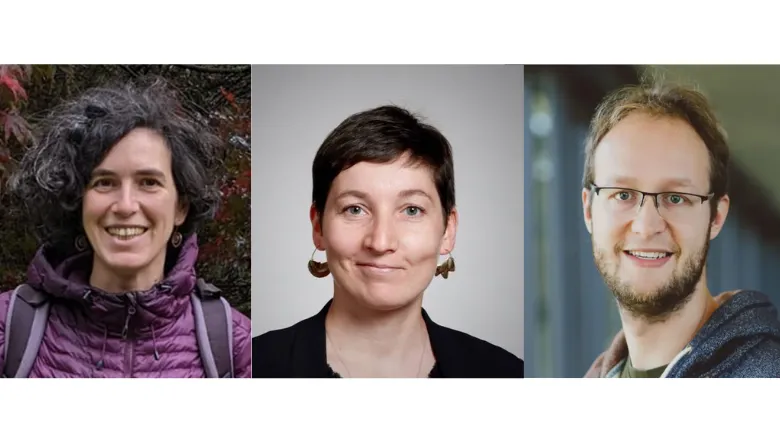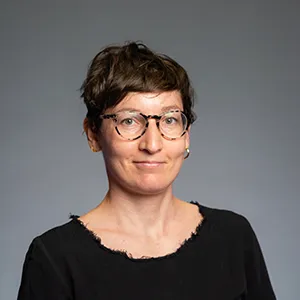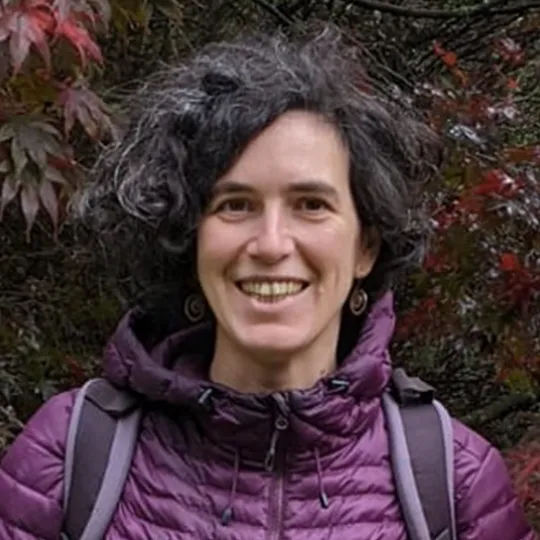25 July 2024
Three King's scientists win prestigious New Investigator Awards
Three King’s academics have been awarded funding from EPSRC to establish research groups.

Three King’s academics have been awarded funding to establish research groups to tackle energy requirements in computing, and explore the possibilities of organic bioelectronic devices.
Dr Chiara Gattinoni from the Department of Physics, Dr Micaela Matta from the Department of Chemistry and Dr Bart De Keijzer from the Department of Informatics have been awarded more than £1 million as part of highly competitive New Investigator Awards.
Funded by the Engineering and Physical Sciences Research Council (EPSRC) the scheme enables early career researchers to establish a research group and develop their own research vision.
Dr Micaela Matta, Lecturer in Chemistry – Data-driving design of organic mixed conductors

Electronic devices have been transforming healthcare since the invention of the first electrocardiographs and pacemakers. Dr Micaela Matta develops computational models to understand organic semiconductors used in bioelectronic devices for healthcare, which could treat conditions that traditional therapies cannot cure.
Made from flexible materials tailored to match the properties of different organs or tissues, organic bioelectronic devices would minimise the body’s inflammatory response. The potential applications include implants for nerve regeneration after spinal cord injuries, wearable glucose sensors for diabetes or ingestible devices to replace invasive diagnostic tests.
“Despite this tremendous potential, designing new materials for bioelectronics is extremely challenging.” Dr Matta says. “This project addresses these challenges using large-scale molecular simulations and computational tools borrowed from other fields, such as drug discovery, that have not yet been applied to bioelectronics.”
The £548,000+ grant enables three years of funding for a Research Software Engineer and Postdoctoral Research Associate to work with Dr Matta to design and test the ideal mixed conductor.
The team will be working with small molecules rather than the more complex polymers, as they are easier to rationalise and can be tested computationally.
“Biology talks in ions, but electronic devices use electronics. We are trying to design materials that can produce signalling between biological and electronic devices, so it needs to speak both languages,” Dr Matta says.
“Experimental project partners will synthesise the most promising materials, validating our predictions and helping refine our predictive models. By collecting a high volume of data on hundreds of new materials, we will gain a better understanding of the fundamental laws governing materials for bioelectronics.”
Dr Chiara Gattinoni, Lecturer in Physics – Customisable polarisation in ultrathin ferroelectics

Dr Chiara Gattinoni’s research is motivated by the pressing need to reduce the energy requirement in computing in order to achieve a net-zero future. From mobile phones to supercomputers and artificial intelligence - as the demand for computer storage increases, so does energy consumption.
“We want to try and make computing more sustainable,” Dr Gattinoni says. “Researchers all over the world have various proposals of what the future of computing will look like, but we are focusing on computer memories and how to make them non-volatile and multi-state.”
Non-volatile computer storage retains data without continuously supplying energy, and only needs an energy supply when data is modified. Multi-state moves beyond binary to store more data than just zeros and ones. This more complex system means a higher density of data can be stored within the same component.
“The energy consumption in computing is getting out of control. To address this very pressing problem, we need materials which have the right properties to create both non-volatile and multi-state storage,” Dr Gattinoni says.
The £720,000+ grant will provide funding for Dr Gattinoni and her research assistants to explore a class of materials which could be suitable to develop this type of storage: ferroelectrics.
Ferroelectrics materials have a polarisation which can be up or down and have been used to make traditional computer memories – with the up and down corresponding to the binary zero and one.
“We want to try and extend this property in ferroelectric materials so they can have a wide range of values to achieve a multi-state storage system,” Dr Gattinoni said.
Dr Bart De Keijzer, Senior Lecturer in Computer Science – Designing Efficient Market Mechanisms with Simplicity Requirements

Dr Bart De Keijzer's research aims to investigate the notion of simplicity in the design of market mechanisms. The proposal is on market mechanism design and their effective and practical implementation.
Market mechanisms design refers to designing platforms and protocols on which markets operate.
"In the settings considered, there are independently acting buying and selling agents present. These can interact with the platform in a predefined way, and the platform itself decides the trades that happen among the the buyers and sellers, in an automated way," Dr De Keijzer says.
The project will study how these platforms should operate to align with the incentives of the agents and maximise efficiency.
The potential applications of this work include in online advertising auctions, online marketplaces, and platforms such as Uber and AirBnb.
"Businesses with a focus on internet technology - such as Meta, Google and Microsoft - actively invest in research on online auctions and market mechanisms."
Dr De Keijzer's proposal for this work involves collaborations with Meta.
There are also potential applications to the double auctions used in financial exchanges, and smart electricity grids. The latter are used by electricity companies on one side, and its consumers on the other side.
The £221,000+ grant will fund 20 percent of Dr De Keijzer's time over the next two yours, and will fund a postdoctoral research assistant for 18 months.



